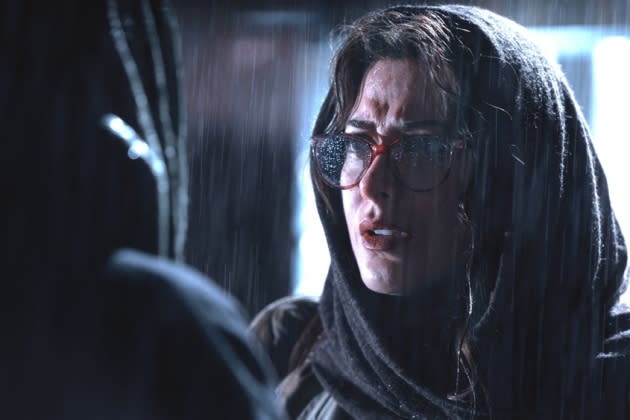Arian Vazirdaftari Delivers Iranian Cinema With Western Influence in ‘Without Her’ – Venice

Arian Vazirdaftari, whose debut feature “Without Her” (“Bi roya”) was picked up by Berlin-based sales company Picture Tree Intl. and is screening as part of Venice Film Festival’s Horizons Extra section, is no stranger to international festivals. He was a part of Berlinale Talent Campus and his short films screened in Busan, Brussels and Cannes among many others.
“I started as a self-taught filmmaker and only landed in film school many years later,” Vazirdaftari says. “My international experiences really helped. I got to know a more professional atmosphere globally, learned about what’s going on in film festivals, how films are selected and distributed.
More from Variety
Harry Styles Makes a Convincing Case for the Matching Gucci Luggage Set at Venice Film Festival
'Valeria Is Getting Married' Sells to Italy, Greece Following Venice World Premiere (EXCLUSIVE)
“There are so many films and filmmakers around the world, so I knew that if I wanted to succeed internationally, I had to have something really special to make a movie about. These experiences made me tougher.”
In “Without Her,” the main protagonist Roya is about to emigrate when she stumbles upon a young, distressed woman, who seems to suffer from memory loss. Roya takes her in and soon after her life starts falling apart. When she finally discovers the woman has come to replace her, it is too late to go back.
Shot on Arri Alexa Mini, the story is an inventive genre crossover, where Hitchcockian traits mix with the motif of the double, well known from Brian De Palma’s oeuvre. All with a pinch of Iranian social realist cinema, something that has with time become an Iranian trademark.
Vazirdaftari is aware of the stereotypes surrounding Iranian cinema. “We have many great filmmakers who specialize in social realist dramas. The audience and the market are used to that. But young filmmakers are interested in other styles too.
“I, for example, grew up surrounded by tons of DVDs, then had a band of film junkies in high school. We were fixated on Scorsese, Polanski, Bergman and Fellini. It had a huge impact on me.
“I try to make films that connect heritage of Iranian cinema with western films I grew up with,” the young filmmaker says. “Making ‘Without Her’ I had ‘Rosemary’s Baby,’ ‘Mulholland Drive’ and ‘Persona’ in mind, but also ‘Maybe Some Other Time’ by the great Bahram Beyzai.
“I feel I could maybe be a part of this new generation, and present a film that tries to touch another aspect, experiment with the narrative. It’s hard both locally and internationally to do that, but I hope the international exposure will help prove it is worth exploring new aspects in Iranian cinema, and introduce them to the world.”
“Without Her” is told from a female perspective. For years men in film spoke in the name of women, with films often ending up as a fantasy about womanhood, shaped by the male gaze rather than a realistic character portrayal. How did Vazirdaftari made sure that Roya – whose hardships are often gender based – was flesh and blood?
“I really tried to gather experiences of women around me when I was writing the script. Listen to women, who tried to emigrate, and had an identity crisis afterwards, or the ones who were forced to quit some other plans of theirs. I also tried to get as much female feedback as I could on the script. I am aware that watching ‘Without Her’ can be an entirely different experience based on the viewer’s gender. Male side often tries to perceive it as an objective plot and solve like a mystery puzzle. For females it’s more of a narrative experiment. They really sympathize with Roya because of shared experiences.”
Vazirdaftari discussed the script in depth with two leading actresses, Tannaz Tabatabaei and Shadi Karamroudi. Building characters was a collaborative process, that required hours of rehearsals. But at the same time the director had the actors’ trust. “I knew that if I tell them: ‘It doesn’t work’ they will try and change it,” says Vazirdaftari. ”I believe that the backstage atmosphere somehow seeps into the final film,” the director says with a smile. “My actors were so prepared. It was not like your usual gig. We agreed to give this film all we had and we did.”
Despite the film being set in a very particular reality, certain struggles seem familiar, especially for viewers with the experience of gaslighting or those ever accused of “overreacting” simply because they voiced their concerns against the mainstream narrative. Roya constantly doubts the reality around her and is being mercilessly shamed for it. But when the end comes she’s the one to say: “I told you so!”
Best of Variety
Sign up for Variety’s Newsletter. For the latest news, follow us on Facebook, Twitter, and Instagram.
